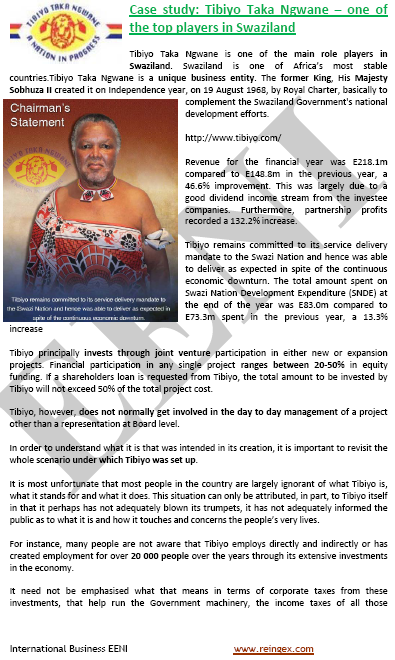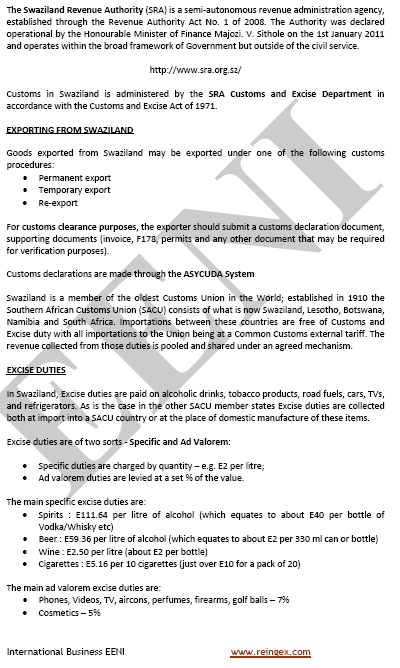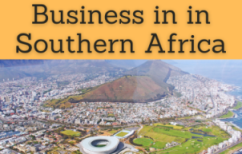Business in Eswatini Mbabane, Liswati Economy
Eswatini (Swaziland): African Kingdom, Logistics, mining (gold, diamonds) Lobamba
The Kingdom of Eswatini is a small African Kingdom based on mining (Diamond, coal, gold).
- Eswatini is a free market Economy
- Low cost of doing business

- Introduction to the Kingdom of Eswatini (Southern Africa)
- Doing Business in Mbabane and Lobamba
- Liswati (Swazi) Economy
- Swazi International Trade
- Swazi Trade Agreements
- Eswatini's Customs: Swaziland Revenue Authority
- Business and Investment Opportunities in Eswatini
- Mining
- Tourism
- Manufacturing
- Swazi Agribusiness
- Set-up a business in Eswatini
- Case Study: Swazi enterprises
- Royal Swaziland Sugar Corporation Limited
- Tibiyo Taka Ngwane - one of the top players in Eswatini
- Access to the Swazi Market
- Transport and Logistics
- Business Plan for Eswatini
Sample - Tibiyo Taka Ngwane


The purposes of the subject “Foreign Trade, Logistics and Business in the Kingdom of Eswatini” are:
- To analyze the Liswati (Swazi) Economy, Logistics and Foreign Trade
- To conduct research on business opportunities in the Kingdom of Eswatini
- To explore the Swazi trade relations with the student's country
- To learn about Swazi Trade Agreements
- To examine the profile of Swazi companies
- To develop a business plan for the Swazi market

The Subject “Foreign Trade, Logistics and Business in Eswatini” is included within the curriculum of the following academic programs at EENI Global Business School:
Doctorate in African Business.

Master in Business in Africa, Transport and Logistics in Africa.

Masters adapted to  Swazi Students.
Swazi Students.
Languages:  or
or  Eswatini
Eswatini  Suazilandia
Suazilandia  Suazilandia.
Suazilandia.
Credits of the Subject “Doing Business in Eswatini”: 1

International Trade, Logistics and Business in Eswatini.



Trade Agreements and preferential access of Eswatini:
- Eswatini and the Southern African Economic Area
- Common Market for Eastern and Southern Africa (COMESA)
- Southern African Development Community (SADC)
- European Union-SADC Agreement
- COMESA-EAC-SADC Agreement
- African Continental Free Trade Area
- Southern African Customs Union (SACU)
- India-SACU Agreement
- EFTA-SACU Agreement
- UK-SACU and Mozambique Economic Partnership Agreement
- MERCOSUR-SACU Preferential Trade Agreement
- European Union-Eswatini
- Africa-EU Partnership
- European Union-GSP
- The United States-Eswatini
- AGOA (U.S.)
- COMESA-U.S. Agreement
- Arab Bank for Africa (BADEA)

- World Trade Organization (WTO)
- Agreement on Sanitary and Phytosanitary Measures
- Agreement on Trade in Services (GATS)
- Agreement on Technical Barriers to Trade
- Agreement on Preshipment Inspection
- Agreement on Safeguards
- Trade Facilitation Agreement
- World Customs Organization (WCO)
- Kyoto Convention
- BIC (Containers)
- Chicago Convention (ICAO)
- IMO - not a member

- Economic Commission for Africa
- African Union
- AU Convention on Preventing and Combating Corruption (not signed)
- AUDA-NEPAD
- Africa Agriculture Development Programme
- African Development Bank
- Africa-Asia Partnership
- Africa-India Cooperation
- Africa-BRICS
- Africa-Turkey Partnership
- Afro-Arab Cooperation
- Arab Bank for Africa (BADEA)
- Africa-Korea Partnership
- Africa-Japan Cooperation
- Africa-South America Summit
- China-Africa Cooperation

- United Nations
- World Bank
- World Trade Organization (WTO)
- International Monetary Fund
- World Custom Organization
- Multilateral Investment Guarantee Agency (MIGA)
- Commonwealth of Nations
- African, Caribbean and Pacific Group (ACP) countries
Eswatini is a landlocked African Country.
- Borders of Eswatini: South Africa and Mozambique
- Population of Eswatini (Africa):
1.4 million inhabitants
- Bantu
- Capital of Eswatini: Mbabane (administrative, 94,874) and Lobamba (legislative)
- Area of Eswatini: 17,363 km²
- Languages of Eswatini: English and siSwati
- Independence of Eswatini from the United Kingdom in 1968
- Currency of Eswatini: Lilangeni (SZL)
More information about Eswatini (EENI African Business Portal).
Main Religions in Eswatini:
- African Traditional Religions
- Christianity (83% of the Swazi population)
Eswatini belongs to the Southern African Economic Area.

Liswati (Swazi) Economy. Economic profile of Eswatini.
- Growth of the transport, storage, and communications sector: 19.3%
- Key sectors of the Liswati (Swazi) Economy: mining (diamond, coal, kaolin, quarried stones, gold), tourism, manufacturing (Motor Car Assembly), and agribusiness (agriculture, horticulture, forestry)
- The European Union and South Africa represent 70% of total exports of Eswatini
Nearest ports. The main import and export ports of Eswatini (landlocked country) are:
- Port of Durban (South Africa).
- Distance Port of Durban-Mbabane: 537 kilometers
- Port of Maputo (Mozambique).
- Distance: 80 kilometers

(c) EENI Global Business School (1995-2025)
Top of this page








 WhatsApp
WhatsApp
